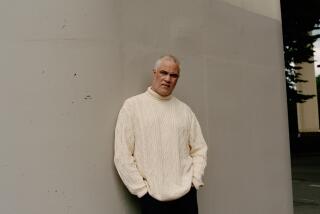A Light Dusting of History, Health, Man and Murk
- Share via
DUST: A History of the Small & the Invisible
by Joseph A. Amato
University of California Press
$22.50, 252 pages
*
Certainly more inevitable than taxes, if not death, is the stuff we call dust. The Bible describes humankind as created out of dust, and the prayers at burial services remind us: “Earth to earth, ashes to ashes, dust to dust.” Astronomers find cosmic dust everywhere, the residue of exploded stars. Dust signals disintegration. “I will show you fear in a handful of dust,” wrote T.S. Eliot in “The Waste Land.” Even household dust is not without its menace, triggering asthma and allergies.
“Once, not so long ago,” cultural historian Joseph Amato reminds us, “dust constituted the finest thing the human eye could see.” For centuries, most people could imagine nothing smaller. Some of the ancient Greek philosophers-scientists like Democritus and Lucretius postulated the existence of something smaller: the invisible, indivisible atom. But at that point in history, there was no proof of such a thing.
Amato’s elegant little book, “Dust: A History of the Small & the Invisible,” not only scrutinizes dust, but reaches out to examine the history of the small and invisible, in general. Although at the outset he draws a neat distinction between dust and its “bigger and clumsier” cousin, dirt, (one being lighter and airborne, the other earthier and generally containing excrement), Amato’s history includes dirt as well. Indeed, his first few chapters take us back to the days when dust, dirt and darkness ruled. “Until the middle of the 18th century,” he writes, “European society was ensconced in darkness and mired in murk.” Peasants lived in windowless, smoky, dirt-floored hovels infested with vermin. Even aristocrats suffered from fleas and lice.
But starting in the late Middle Ages, scientists, artists, thinkers and craftsmen began exploring the kingdom of the minuscule. Mirrors, magnifying lenses and measuring instruments opened up an unseen world. Indeed, Amato goes so far as to attribute the global dominance of Western civilization to its acquired ability to understand and regulate the microscopic realm of germs, spores, cells, viruses, electrons, atoms, genes and microchips.
By the mid-19th century, what Amato calls “The Great Cleanup” was underway, as doctors, public health officials, politicians, scientists and housewives waged war on germs, decay and dirt. By the 20th century, the traditional hierarchy had been inverted: The smallest things had become the most important.
Amato thinks that too many of us nowadays have forgotten the lessons of past generations who waged war on germs. It’s easy to sneer at the “sterility” of the sanitized, deodorized environment and it’s easy to wallow in the “earthiness” of oh-so-natural dirt when you’ve forgotten what genuine horrors untamed Nature still holds.
But he also recognizes the reason why many people have come to suspect that nature has more to fear from man than the other way around. The unforeseen consequences of pesticides and antibiotics, the chemical and radioactive pollution caused by industry and technology strike many people as more frightening than the traditional danger of germs. Amato fears that pitting nature lovers against germ warriors is a big mistake. For, clearly, man-made pollutants like DDT and natural menaces like viruses are both grave threats to public health.
A professor of intellectual and cultural history at Southwest State University in Minnesota, Amato is nothing if not interdisciplinary. Although one thinks of the interdisciplinary approach as modern, almost trendy, its end product can be rather charmingly quaint, reminiscent of the days when gentleman-scholars wrote urbane ruminations on subjects of interest to the general reader.
Indeed, the subjects of Amato’s previous books range from “Victims and Values: A History and Theory of Suffering” to “Golf Beats Us All (So We Love It).” “Dust” is a diverting, thought-provoking amalgam of science, literature, intellectual and social history. Playful yet serious, Amato’s supple prose conveys the hidden poetry of his subject.
More to Read
Sign up for our Book Club newsletter
Get the latest news, events and more from the Los Angeles Times Book Club, and help us get L.A. reading and talking.
You may occasionally receive promotional content from the Los Angeles Times.









